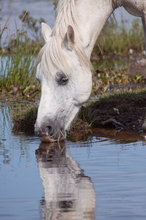Equine protozoal myeloencephalitis (EPM) is a progressive and potentially fatal infection of the central nervous system that most often occurs in the summer and fall seasons. It is caused by a single-celled protozoal microorganism, most commonly S. neurona, and is primarily transferred by opossums through their feces.

Exposure to EPM via opossum feces in wooded areas
Researchers estimate that approximately 30 to 80% of the U.S. horse population has come in contact with the parasite that causes EPM.
Researchers estimate that approximately 30 to 80% of the U.S. horse population has come in contact with the parasite and produced antibodies that can be measured in their blood. However, not all horses exposed become infected or develop clinical signs. In fact, the incidence of EPM may be less than 1%.
There is no way to prevent EPM as no vaccine exists. The best way to reduce the risk of your horse contracting the disease is to minimize exposure to opossum feces. All age groups of horses may be affected, however, EPM is most common in younger horses 1 - 7 years of age.
Risk factors include:
- Presence of opossums
- Previously infected horses on premises
- Summer and fall seasons (winter has fewer cases)
- Stress - including shipping or recent illness
- Wooded terrain near pastures
- Feed and hay accessible to opossums
While EPM is nearly impossible to prevent, controlling bird and opossum populations can help:
- Keep opossums out of barns and away from feed and bedding
- Keep tight covers on grain
-
Feed horses processed grain steam-crimped and pelleted to kill
parasites - Install mesh wire fencing with a “hot wire” around the outside to deter opossums (they climb instead of dig)
- Dispose of dead animals, including birds, small rodents and opossums, to prevent the spread of parasitic eggs.
- Limit bird populations in the barn
